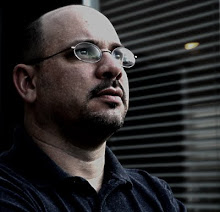Who are Black Country Communion you say?
Shame... Shame on you for not knowing. Well, actually it's not that surprising.
Black Country Communion
But that's not the point.
The point is that while talking with one of the folks who felt the need to comment on my shirt (a drummer who supposedly knew Joe B. when he was just a wee lad), he made the comment, "Man, it's too bad he can't make it in the music scene today..." I said, "What do you mean - he HAS made it."
The rules of success in the music industry have just radically changed from where they were twenty years ago or so.
Joe Bonamassa has a loyal following who buy all his records. He tours all over the world. He even got to play with Eric Clapton at the Royal Albert Hall. That's success in today's music biz. Is he a household name? No, but he's not a 15-year old pop star kid either. The music biz is now even more divided between the 5 or 6 mega stars who are heavily marketed (Lady Gaga, Black Eyed Peas, Justin Bieber, etc.), and everyone else. It used to be you made money off sales of your CDs, but that's long gone. Now the CD (er... digital download I mean) is a loss-leader just to get people excited about your live shows. Cashflow is based mostly on ticket sales and merchandising revenue.
The time when an artist could make a living off the intellectual property of their art may be coming to an end. And it's all your fault.
Yep, it's your dang fault for having an insatiable need to consume music and movies and not want to pay anything for them. Once something can be digitized and transmitted as zeroes and ones on the net, it inevitably spirals down to a value of zero. Folks just don't wanna pay if they don't have to.
And this is the sad future for filmmakers as well.
Thanks to Netflix, the assumption is that at any time I can click on a box and instantly watch great entertainment in the comfort of my home. For free. Or nearly free. As a consumer, this is amazing. As a film buff I can now watch all sorts of titles I never would have been exposed to before. I know so many more directors and their visions. But are those filmmakers, really being compensated for all this?
Not really.
The indie film I edited and co-produced, The Commune, was offered a deal by Netflix for their Watch Instantly streaming service. Do you know what they offered us?
$7500.
And that was before the distributor took their 30% cut.
So, let's see, our meager budget was under $100,000. Hardly anyone got paid. And now, Netflix wants to own it and allow anyone in the world to watch it for free in the comfort of their own home. And for all that, we'll be compensated around $5000.
Now I'm not knocking 5 grand. Hey, that's better than nothing. Many filmmakers would love to be offered a Netflix deal.
But, do the math. It's not rocket science. There is no sustainable business model there.
Now, musicians have a way to get around this dilemma. They no longer expect to make money off their art. They can make money off their live performances. And so now they are always on the road - like a hamster on a treadmill - keeping the machine running.
 |
| Live to rock and rock to live! |
But filmmakers don't have this revenue stream. We don't get paid for live performances. Our films are our live performances. Unless you're Kevin Smith, no one really gives a s#!+ about hearing or seeing the director - they just wanna see the movie.
So how will the indie filmmaker survive in this climate?
I don't know. I really can't see it.
The only business model I can see working is to crowd-source the funding of your film. Spread the risk. Let your true fans feel like they are part of the process. Set up a kickstarter campaign and raise just enough money to hopefully cover costs. Maybe pad it a little so you can actually pay your rent while making the film. Then at least any scraps of revenue that are generated will be profit.
Do not go into debt and take out a mortgage on your home to make your next indie feature film kiddos. It ain't worth it.
Welcome to the future. Everything is possible but nothing is real.*
*(Living Colour - Type)



.jpg)



